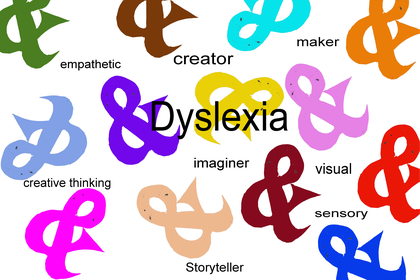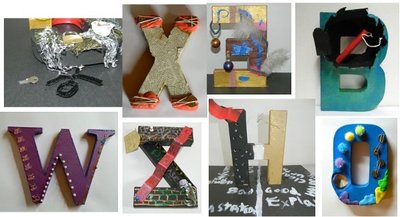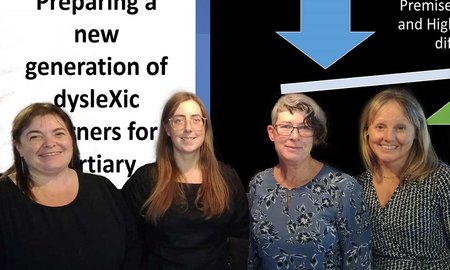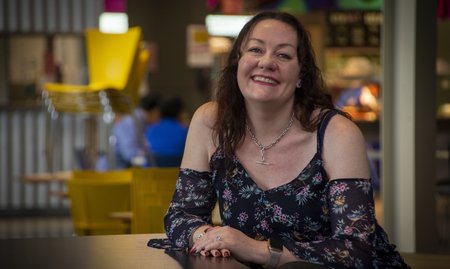
As Dyslexia Awareness Week begins, the lack of positive and cohesive change again echoes across our schools, tertiary institutions, and workplaces. There is talk of accommodations and affordances to make things easier for dyslexic students, but this is without really examining underlying assumptions of the framing of the mythical ‘normal’ student.
Some years ago, I spoke with students in the United Kingdom (UK) - where legislation around dyslexia has existed for longer than dyslexia has been even recognised in Aotearoa New Zealand - about their experiences and high levels of accommodations. They said when they left their education institutions, they had not learned how they learn and required ongoing additional help. I heard of universities buying computers for dyslexic students and offering them extra time for exams. The result was that those who had worked out for themselves how they learned, and others who thrashed themselves causing self-harm, were achieving a degree. This is not uncommon.
“I don't think I ever used my body as an excuse, instead it became something to conquer and mutilate, so that I could succeed like those other selves that don't even have to think about their bodies.”
DIS- ability
We need to think seriously about the language that is used and the deficit focus of that language. Afterall, accommodations are only needed if the existing system does not cater for you, because you are apart from the ‘norm.’
Dyslexia is linked to phrases like learning disability and neurodisability which negate the divergent possibilities and ways of knowing that are part of dyslexia. The social model of disability would say that this is because existing systems are not designed for them. But a neurodiverse paradigm takes this one step further to recognise the existing structures and to point out the problems with them, challenging existing ‘norms’ and raising neurodivergent voices by valuing them.
Dyslexia Awareness Week is an opportunity to action real change which moves beyond accommodations into empowering dyslexic people to be truly aware of this valid and important way of being, to no longer feel the need to hide or be ashamed. There is a call within the neurodiverse paradigm for real, urgent and actual change which challenges the cognitive othering prevalent in terms like accommodations, support and affordances. To step away from the “overcomer” narratives which reinforce existing norms into thinking about what is needed to create real change. Real change would mean access for all.
Imagine having your way of thinking about the world, understanding it, and engaging with it constantly undermined. Being told you are less just for being you or that ‘there is something missing or wrong with you.’ We need to think about the stories we tell because dyslexics are incredible people just for being them. It should not be about overcoming or needing to be more than others - they are enough in and of themselves.

Each of these letters was created by a dyslexic to represent experience of language from words exploding with meaning to words feeling locked away (R.Gibbons).
But what about text?
Dyslexia is intimately linked with the written word, and it is often reduced to text even though dyslexia is so much more. Dyslexics have abilities and skills which often get devalued because of the text-dominant society we live in. The written word here, in comparison to many parts of the world, is relatively new and arrived with colonisation.
Aotearoa New Zealand has a history of knowledge and learning which was not reliant on text, so we know of other ways of learning, of thinking about the world that other countries do not and this needs to be part of our discussions about awareness. There is an incredible potential to collaboratively explore across multiple ways of knowing, framing, and communicating about the world that could be of real value to neurodivergent learners, but also to us all.
Rather than silently following the accommodations approach of other countries which reinforce a ‘mythical norm’ we need to be looking across all these ways of being.
‘Made by Dyslexia’ in the UK is seeking to change the disability and ‘less than’ discussions of dyslexia. They have seen people struggling to move beyond labels of disability and the dyslexia community are part of creating this change through programmes, education, and art.
So, why not take the opportunity this week to start a conversation in which dyslexia is welcomed and valued?
Talk about valuing other ways of being-in-the-world and be open to the possibilities of what dyslexics bring to the table. Decide whether it is really that important to correct the spelling or grammar of someone’s media post or text. Start to create real change and value for neurodivergence in all walks of life.
Dr Ruth Gibbons is a Lecturer in Social Anthropology, at Massey’s School of People, Environment and Planning.
Related news
Preparing a new generation of learners for tertiary education
Four Massey staff members conducted a workshop at the New Zealand Post Primary Teachers' Association Te Wehengarua Conference in Wellington.

Opinion: Time to reconnect – slow and steady does it
Dr Kirsty Ross reminds us to take the time to reconnect with the things that are important to us this Mental Health Awareness Week.
